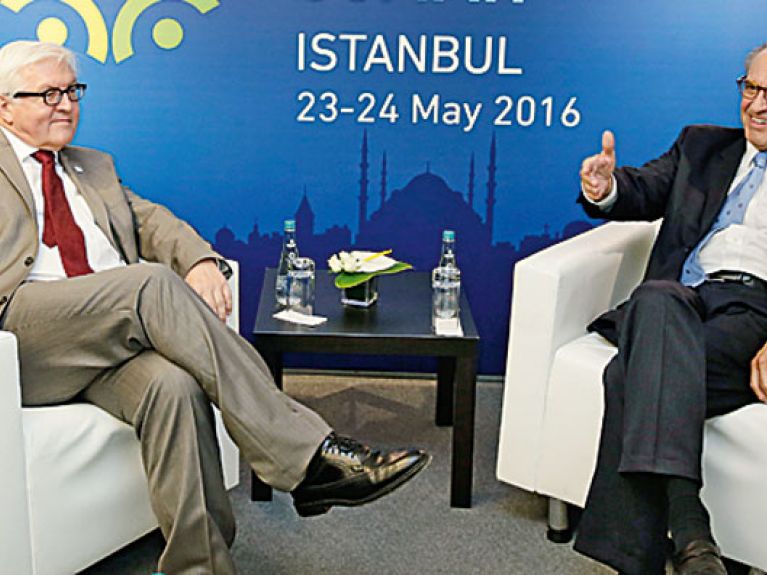The World Humanitarian Summit
The initiative by Ban-Ki moon, Secretary-General of the United Nations, brought together the central actors and strengthened the humanitarian system.

The challenges facing humanitarian aid have increased dramatically in recent years: 120 million people worldwide are dependent on humanitarian aid and some 60 million people have fled their homes – the highest number since the end of the Second World War. Crises, conflicts and disasters have increased, not only in number, but also in complexity and duration. At the same time, there has been an increase in violations of international humanitarian law, attacks on medical facilities and the denial of humanitarian access to people in need. Global humanitarian needs continue to grow. The international community can only overcome these challenges by working together. The first World Humanitarian Summit has strengthened the international humanitarian system so that it can overcome these challenges. At the same time, humanitarian needs are to be reduced in the long term.
On 23 and 24 May, following a two-year, global consultation process, the World Humanitarian Summit brought together approximately 9,000 representatives of governments, humanitarian organisations, civil society and the private sector from all over the world at the invitation of the Secretary-General of the United Nations (UN), Ban Ki-moon. Summit participants made commitments to strengthen the humanitarian system in order to better serve people in need. This summit approach was unique and reflects the diversity of humanitarian actors. As the third largest humanitarian donor, Germany was prominently represented at the summit by Chancellor Merkel, Foreign Minister Steinmeier and Development Minister Müller, members of parliament and representatives of German non-governmental organisations; it also made an active contribution to shaping the key areas of the summit.
One key area of the summit was the involvement of local actors as well as the population affected by crises and disasters. They are to be more strongly involved through a further simplification of the humanitarian system. The so-called Grand Bargain, which was co-negotiated by Germany, is one of the key documents of the summit. It contains concrete collective commitments in the core areas of humanitarian aid by the largest humanitarian donors, UN agencies, the Red Cross/Red Crescent movement, associations of NGOs as well as the International Organization for Migration (IOM) and the World Bank. The Grand Bargain aims to make humanitarian aid faster, less bureaucratic and more responsive and at the same time strengthen the role of local civil society and people in need as actors in shaping and implementing humanitarian aid.
The enormous challenges confronting the humanitarian system remain. That is why the global summit was essential in bringing together central actors in order to strengthen joint action to address this task. The continuing underfunding of global humanitarian aid remains a cause for concern. At the summit, Germany pledged a further 10 million euros to the UN Central Emergency Response Fund and called upon other states to provide additional funds for humanitarian aid. ▪

